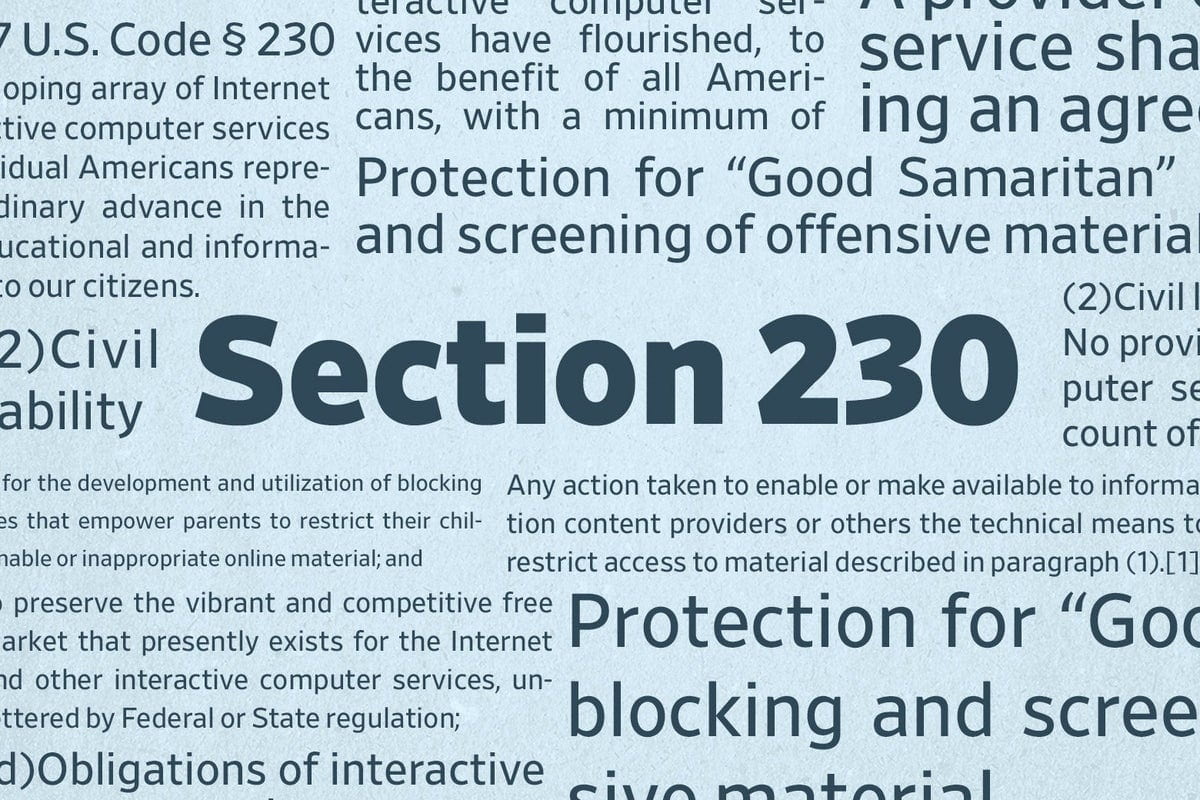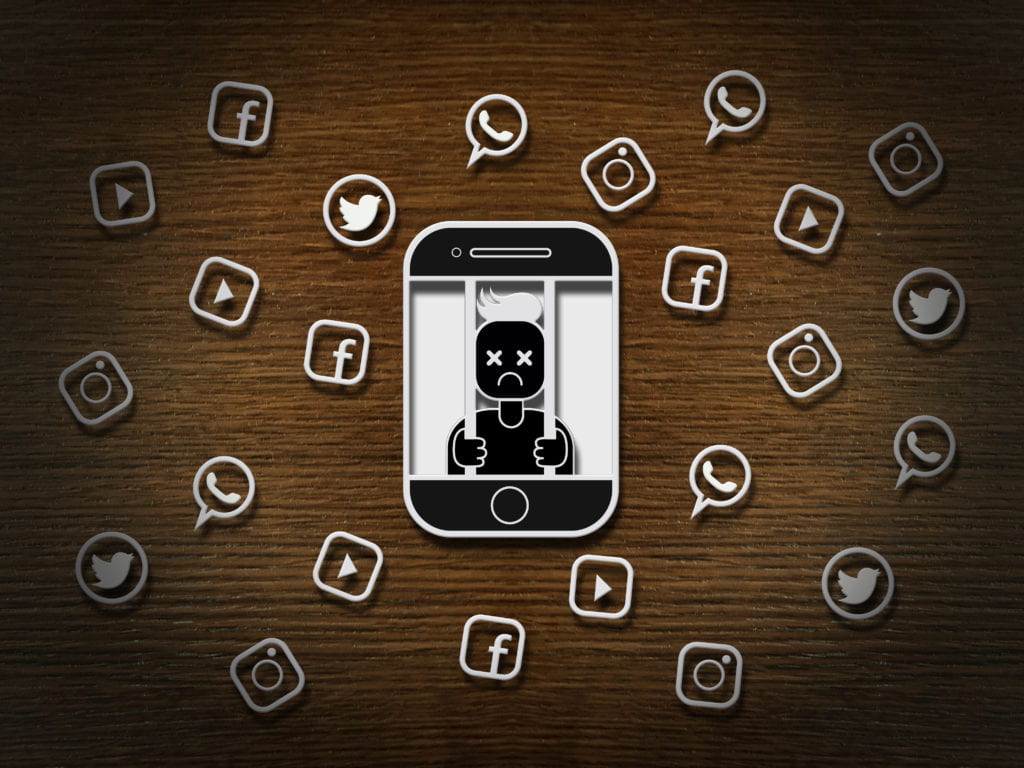Section 230 of the Communications Decency Act (CDA), protects private online companies from liability for content posted by others. This immunity also grants internet service providers the freedom to regulate what is posted onto their sites. What has faced much criticism of late however, is social media’s immense power to silence any voices the platform CEOs disagree with.
Section 230(c)(2), known as the Good Samaritan clause, states that no provider shall be held liable for “any action voluntarily taken in good faith to restrict access to or availability of material that the provider or user considers to be obscene, lewd, lascivious, filthy, excessively violent, harassing, or otherwise objectionable, whether or not such material is constitutionally protected.”
When considered in the context of a ‘1996’ understanding of internet influence (the year the CDA was created) this law might seem perfectly reasonable. Fast forward 25 years though, with how massively influential social media has become on society and the spread of political information, there has developed a strong demand for a repeal, or at the very least, a review of Section 230.
The Good Samaritan clause is what shields Big Tech from legal complaint. The law does not define obscene, lewd, lascivious, filthy, harassing or excessively violent. And “otherwise objectionable” leaves the internet service providers’ room for discretion all the more open-ended. The issue at the heart of many critics of Big Tech, is that the censorship companies such as Facebook, Twitter, and YouTube (owned by Google) impose on particular users is not fairly exercised, and many conservatives feel they do not receive equal treatment of their policies.
Ultimately, there is little argument around the fact that social media platforms like Facebook and Twitter are private companies, therefore curbing any claims of First Amendment violations under the law. The First Amendment of the US Constitution only prevents the government from interfering with an individual’s right to free speech. There is no constitutional provision that dictates any private business owes the same.
Former President Trump’s recent class action lawsuits however, against Facebook, Twitter, Google, and each of their CEOs, challenges the characterization of these entities as being private.
In response to the January 6th Capitol takeover by Trump supporters, Facebook and Twitter suspended the accounts of the then sitting president of the United States – President Trump.
The justification was that President Trump violated their rules by inciting violence and encouraged an insurrection following the disputed election results of 2020. In the midst of the unrest, Twitter, Facebook and Google also removed a video posted by Trump, in which he called for peace and urged protestors to go home. The explanation given was that “on balance we believe it contributes to, rather than diminishes the risk of ongoing violence” because the video also doubled down on the belief that the election was stolen.
Following long-standing contentions with Big Tech throughout his presidency, the main argument in the lawsuit is that the tech giants Facebook, Twitter and Google, should no longer be considered private companies because their respective CEOs, Mark Zuckerberg, Jack Dorsey, and Sundar Pichai, actively coordinate with the government to censor politically oppositional posts.
For those who support Trump, probably all wish to believe this case has a legal standing.
For anyone else who share concerns about the almost omnipotent power of Silicon Valley, many may admit that Trump makes a valid point. But legally, deep down, it might feel like a stretch. Could it be? Should it be? Maybe. But will Trump see the outcome he is looking for? The initial honest answer was “probably not.”
However, on July 15th 2021, White House press secretary, Jen Psaki, informed the public that the Biden administration is in regular contact with Facebook to flag “problematic posts” regarding the “disinformation” of Covid-19 vaccinations.
Wait….what?!? The White House is in communication with social media platforms to determine what the public is and isn’t allowed to hear regarding vaccine information? Or “disinformation” as Psaki called it.
Conservative legal heads went into a spin. Is this allowed? Or does this strengthen Trump’s claim that social media platforms are working as third-party state actors?
If it is determined that social media is in fact acting as a strong-arm agent for the government, regarding what information the public is allowed to access, then they too should be subject to the First Amendment. And if social media is subject to the First Amendment, then all information, including information that questions, or even completely disagrees with the left-lean policies of the current White House administration, is protected by the US Constitution.
Referring back to the language of the law, Section 230(c)(2) requires actions to restrict access to information be made in good faith. Taking an objective look at some of the posts that are removed from Facebook, Twitter and YouTube, along with many of the posts that are not removed, it begs the question of how much “good faith” is truly exercised. When a former president of the United States is still blocked from social media, but the Iranian leader Ali Khamenei is allowed to post what appears nothing short of a threat to that same president’s life, it can certainly make you wonder. Or when illogical insistence for unquestioned mass emergency vaccinations, now with continued mask wearing is rammed down our throats, but a video showing one of the creators of the mRNA vaccine expressing his doubts regarding the safety of the vaccine for the young is removed from YouTube, it ought to have everyone question whose side is Big Tech really on? Are they really in the business of allowing populations to make informed decisions of their own, gaining information from a public forum of ideas? Or are they working on behalf of government actors to push an agenda?
One way or another, the courts will decide, but Trump’s class action lawsuit could be a pivotal moment in the future of Big Tech world power.



